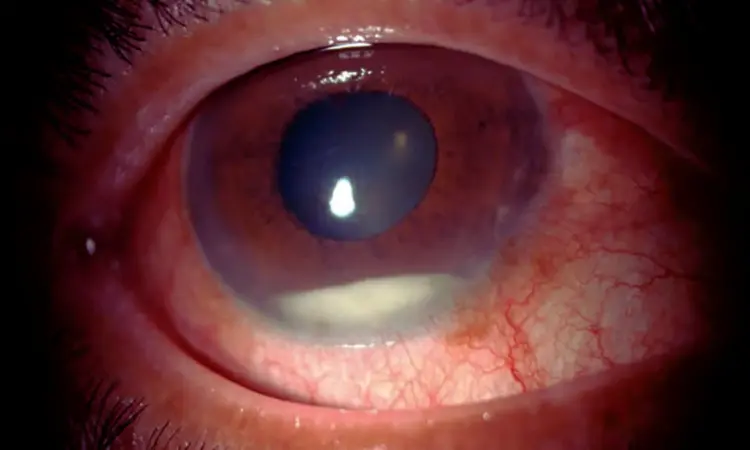- Home
- Medical news & Guidelines
- Anesthesiology
- Cardiology and CTVS
- Critical Care
- Dentistry
- Dermatology
- Diabetes and Endocrinology
- ENT
- Gastroenterology
- Medicine
- Nephrology
- Neurology
- Obstretics-Gynaecology
- Oncology
- Ophthalmology
- Orthopaedics
- Pediatrics-Neonatology
- Psychiatry
- Pulmonology
- Radiology
- Surgery
- Urology
- Laboratory Medicine
- Diet
- Nursing
- Paramedical
- Physiotherapy
- Health news
- Fact Check
- Bone Health Fact Check
- Brain Health Fact Check
- Cancer Related Fact Check
- Child Care Fact Check
- Dental and oral health fact check
- Diabetes and metabolic health fact check
- Diet and Nutrition Fact Check
- Eye and ENT Care Fact Check
- Fitness fact check
- Gut health fact check
- Heart health fact check
- Kidney health fact check
- Medical education fact check
- Men's health fact check
- Respiratory fact check
- Skin and hair care fact check
- Vaccine and Immunization fact check
- Women's health fact check
- AYUSH
- State News
- Andaman and Nicobar Islands
- Andhra Pradesh
- Arunachal Pradesh
- Assam
- Bihar
- Chandigarh
- Chattisgarh
- Dadra and Nagar Haveli
- Daman and Diu
- Delhi
- Goa
- Gujarat
- Haryana
- Himachal Pradesh
- Jammu & Kashmir
- Jharkhand
- Karnataka
- Kerala
- Ladakh
- Lakshadweep
- Madhya Pradesh
- Maharashtra
- Manipur
- Meghalaya
- Mizoram
- Nagaland
- Odisha
- Puducherry
- Punjab
- Rajasthan
- Sikkim
- Tamil Nadu
- Telangana
- Tripura
- Uttar Pradesh
- Uttrakhand
- West Bengal
- Medical Education
- Industry
Case Report Highlights Rare Endophthalmitis Following Botulinum Toxin Injection for Strabismus

Saudi Arabia: A case report published in BMC Ophthalmology has highlighted an extremely rare complication of botulinum toxin A (BTA) treatment for strabismus, documenting the occurrence of acute endophthalmitis following an inadvertent intravitreal injection. The report, authored by Saud Mohammed Aljohani and colleagues from the Department of Ophthalmology, College of Medicine, Imam Abdulrahman Bin Faisal University, Dammam, Saudi Arabia, emphasizes the need for early recognition and prompt intervention to prevent irreversible vision loss in such cases.
BTA injections are widely regarded as a minimally invasive and effective alternative to conventional strabismus surgery. While the procedure is generally safe, complications such as globe perforation and unintended intraocular delivery have been reported. It may lead to severe outcomes like retinal detachment, vitreous hemorrhage, or retinal toxicity. However, post-injection endophthalmitis remains exceedingly uncommon, with only one previously documented case resulting in complete vision loss.
The case involved a 3-year-old boy with esotropia and a history of De Morsier’s syndrome who underwent BTA injection into both medial rectus muscles. During the procedure, inadvertent needle penetration of the globe was suspected in the left eye. Although the immediate post-procedure fundus examination was largely unremarkable, the child presented a week later with symptoms of photophobia, pain, and redness. Clinical findings revealed severe intraocular inflammation, leading to a diagnosis of acute post-operative endophthalmitis.
The medical team initiated urgent management, performing a vitreous tap, pars plana vitrectomy (PPV), intravitreal antibiotic administration, and silicone oil tamponade. They observed intraoperatively dense vitreous opacities, but the optic disc and macula remained intact. Microbiological cultures from vitreous samples returned negative, ruling out detectable bacterial or fungal infection. Despite the severity of the inflammation, early intervention resulted in full resolution of infection, retinal attachment, and preservation of vision to baseline levels following subsequent silicone oil removal.
Aljohani and colleagues stressed the clinical importance of maintaining vigilance during BTA injections for strabismus and emphasized that any suspicion of globe penetration warrants close post-procedural monitoring. They noted that endophthalmitis after inadvertent intravitreal botulinum toxin injection, though rare, poses a serious threat to ocular integrity and visual function if not addressed promptly.
The report contributes valuable insight into the management of such unusual complications, reinforcing the importance of sterile technique, careful injection protocols, and rapid response to post-procedure symptoms. The authors concluded that heightened awareness among ophthalmologists can aid in early diagnosis and timely intervention, which are critical to preventing irreversible ocular damage and optimizing visual outcomes in pediatric patients undergoing BTA treatment for strabismus.
Reference:
Aljohani, S.M., Alharbi, A.S. & Alhayaza, R.M. Endophthalmitis following inadvertent intravitreal injection of botulinum toxin: a case report and literature review. BMC Ophthalmol 25, 429 (2025). https://doi.org/10.1186/s12886-025-04269-4
Dr Kamal Kant Kohli-MBBS, DTCD- a chest specialist with more than 30 years of practice and a flair for writing clinical articles, Dr Kamal Kant Kohli joined Medical Dialogues as a Chief Editor of Medical News. Besides writing articles, as an editor, he proofreads and verifies all the medical content published on Medical Dialogues including those coming from journals, studies,medical conferences,guidelines etc. Email: drkohli@medicaldialogues.in. Contact no. 011-43720751


